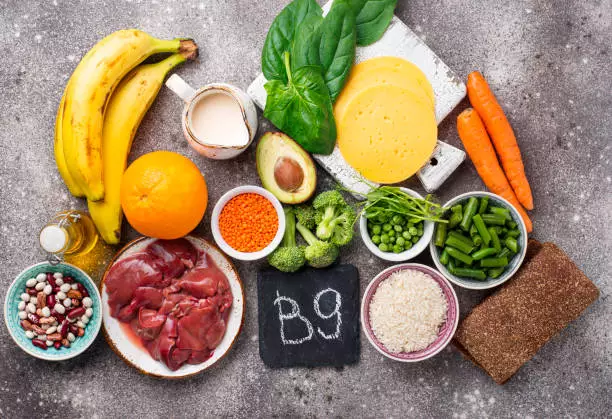
Folate, also known as vitamin B9, is a water-soluble vitamin that is essential for the body to function properly. Naturally present in many foods, this vitamin plays a crucial role in various functions of the human body. This article explains all the key aspects of folate, its dietary sources, its importance for the body, and the consequences of a deficiency.
Folate is essential for DNA andRNA synthesis. It enables cells to divide and grow, which is particularly important during periods of rapid growth, such as in foetuses and young children. Adequate levels of this vitamin help to prevent congenital malformations of the neural tube in the embryo.
One of the vital functions of vitamin B9 is to promote the production of red blood cells. Folate deficiency can lead to megaloblastic anaemia, characterised by abnormally large and inefficient red blood cells, causing fatigue and weakness.
Folate also plays a role in cognitive function and mental health. Insufficient levels of this vitamin are associated with an increased risk of depression, cognitive disorders and other neurodegenerative diseases.
Folate requirements vary according to age, sex and specific physiological conditions such as pregnancy or breastfeeding. In general, adults need around 400 micrograms (mcg) per day, while pregnant women may need up to 600 mcg daily.
Folic acid is the synthetic form of folate, often used in food supplements and fortified foods. Women wishing to conceive or who are already pregnant are advised to take folic acid supplements to reduce the risk of congenital malformations.
Folate deficiency can lead to anaemia, with symptoms such as extreme fatigue, muscle weakness and shortness of breath. This condition results from insufficient production of healthy red blood cells.
In children, prolonged vitamin B9 deficiency can impair growth and physical and mental development. It is essential to ensure that young people get enough folate in their diet to avoid these undesirable effects.
For pregnant women, a deficiency in this vitamin can have serious consequences for the development of the embryo, increasing the risk of neural tube defects, spina bifida and other congenital complications.
Certain medical conditions such as coeliac disease or Crohn’s disease can interfere with theabsorption of folate in the intestines, leading to deficiency despite adequate intake of this vitamin.
Certain drugs can also interfere with folate absorption. These include anticonvulsants, certain cancer treatments and oral contraceptives. People taking these drugs must be careful to maintain their vitamin B9 levels.
Freshness, low temperatures and short cooking times help to minimise folate loss. For example, steaming vegetables quickly instead of boiling them can preserve more of their vitamin B9 content.
Avoid storing folate-rich foods for too long, as this vitamin degrades over time. Eat them quickly after purchase to get the maximum nutritional benefit.
In terms of absorption, synthetic folic acid is generally better absorbed by the body than the natural folate found in foods. However, the choice between natural and synthetic forms should be based on individual needs and medical consultation.
It is rare to suffer from excess folate from food alone. However, folic acid overdose is possible, especially via supplements. Excessive intake can mask the symptoms of vitamin B12 deficiency, delaying diagnosis and treatment.
In summary, vitamin B9 is a key nutrient for several vital functions in our body. From its contribution to the formation of DNA to the help it provides in the production of red blood cells, via its role in mental health, it is essential for a healthy life. Make sure you get all the nutrients you need, both in your daily diet and, if necessary, via appropriate supplements.
